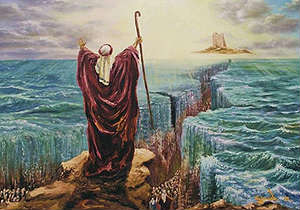
The Parting of the Red Sea or Crossing of the Red Sea is an episode in The Exodus, a foundational story in the Hebrew Bible.
It tells of the escape of the Israelites, led by Moses, from the pursuing Egyptians, as recounted in the Book of Exodus. Moses holds out his staff and God parts the waters of the Yam Suph, which is traditionally presumed to be the Red Sea, although other interpretations have arisen. With the water dispersed, the Israelites were able to walk on dry ground and cross the sea, followed by the Egyptian army. Once the Israelites have safely crossed, Moses drops his staff, closing the sea, and drowning the pursuing Egyptians.
According to Wikipedia, no clear archaeological evidence has been found that directly supports the story of Exodus
No clear archaeological evidence has been found that directly supports the story of Exodus, other than the biblical account. Zahi Hawass, an Egyptian archaeologist and formerly Egypt's Minister of State for Antiquities Affairs, says: "Really, it’s a myth... Sometimes as archaeologists we have to say that never happened because there is no historical evidence." Despite the lack of evidence, some have created theories as to what may have inspired the biblical authors' narrative, providing natural explanations.
——
I do not want to discuss the historicity of the episode of Exodus mentioned in the Hebrew Bible. I have mentioned it as a prologue to my idea that there was a mention of rivers lowering the water level, conceding to the request of ṛṣi Viśvāmitra (Rig Veda 3.33), so that the forces of Bharata can move on. After crossing of Bharata’s forces, the rivers are requested to swell again.
Though the narration of the Rig Veda apparently indicate a historic event of forces of Bharata crossing the rivers, it actually point towards spiritual aspects, mentioned allegorically.
The narration in Rig Veda is as follows:
This consists of a dialogue between Vipāś and Śutudrī rivers and ṛṣi Viśvāmitra, who begs the rivers to stop in their course to allow the Bharata forces, to cross. They accede to his request in return for his ensuring their future fame in his poetry, and the Bharatas cross successfully, after which the rivers are urged to refill themselves with water and flow again.
रमध्वं मे वचसे सोम्याय ऋतावरीरुप मुहूर्तमेवैः । प्र सिन्धुमच्छा बृहती मनीषावस्युरह्वे कुशिकस्य सूनुः ॥
ramadhvam me vacase somyāya ṛtāvarīr upa muhūrtam evaiḥ | pra sindhum acchā bṛhatī manīṣāvasyur ahve kuśikasya sūnuḥ ||Stop for my somian speech, truthful ones, for an instant, in your travels. My lofty inspired thought (has gone) forth to the river: seeking help, have I, the son of Kuśika, called upon (you).
ओ षु स्वसारः कारवे शृणोत ययौ वो दूरादनसा रथेन । नि षू नमध्वं भवता सुपारा अधोअक्षाः सिन्धवः स्रोत्याभिः ॥
o ṣu svasāraḥ kārave śṛṇota yayau vo dūrād anasā rathena | ni ṣū namadhvam bhavatā supārā adhoakṣāḥ sindhavaḥ srotyābhiḥ ||Listen well to the bard, sisters. He has driven to you from afar with his wagon and chariot. Bow down; become easy to cross, staying below his axle(s) with your currents, you rivers.
यदङ्ग त्वा भरताः संतरेयुर्गव्यन्ग्राम इषित इन्द्रजूतः । अर्षादह प्रसवः सर्गतक्त आ वो वृणे सुमतिं यज्ञियानाम् ॥
yad aṅga tvā bharatāḥ saṃtareyur gavyan grāma iṣita indrajūtaḥ | arṣād aha prasavaḥ sargatakta ā vo vṛṇe sumatiṃ yajñiyānām ||When the Bharatas should really have crossed you entirely—the horde seeking cattle, propelled, sped by Indra—then certainly your forward thrust, launched in a surge, will rush (again). I wish for the favor of you who deserve the sacrifice.
No comments:
Post a Comment